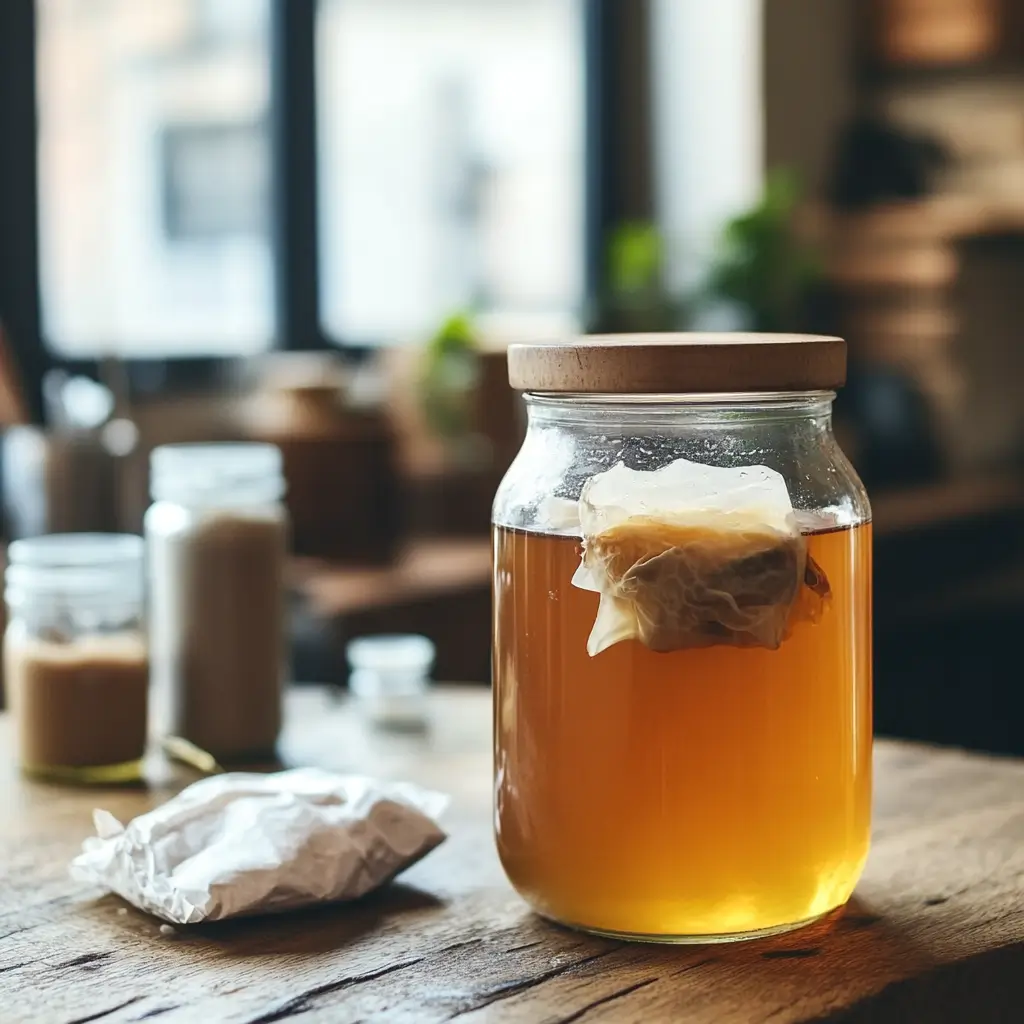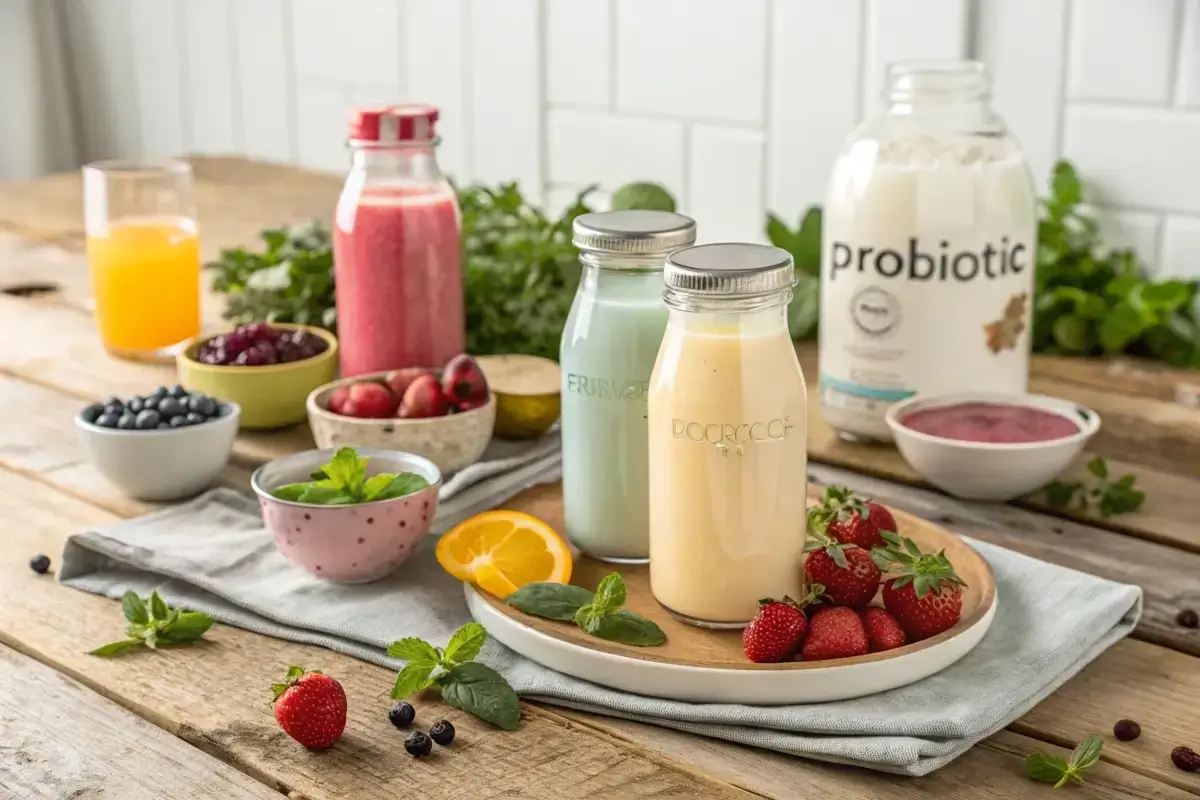Probiotic drinks have taken the health and wellness world by storm—and for good reason! These beverages are packed with live, beneficial microorganisms that work wonders for your gut and overall health. Whether you’re sipping on kefir, enjoying a yogurt-based drink, or diving into the fizzy goodness of kombucha, there’s something for everyone in the world of probiotic drinks. This article dives into everything you need to know about these gut-friendly beverages, from their health benefits and types to how you can choose the right one for you.
Introduction to Probiotic Drinks
What Are Probiotic Drinks?
Probiotic drinks are beverages enriched with live microorganisms, primarily bacteria and yeast, that help maintain or improve your gut flora. These drinks are typically fermented, allowing the growth of these good bacteria that can positively impact digestive and immune health. Think of them as a tasty way to take care of your gut!
The Science Behind Probiotics
Your gut is home to trillions of bacteria, both good and bad. Probiotics, often referred to as friendly bacteria, help balance this ecosystem. Research has shown that a healthy gut microbiome can influence everything from digestion to mental health. Probiotic drinks deliver these helpful microorganisms in an easily digestible form.
Why Are Probiotic Drinks Popular?
Probiotic drinks have surged in popularity thanks to their reputation as a convenient health booster. Modern diets, often high in processed foods and low in fiber, can wreak havoc on gut health. These drinks offer a simple solution to replenish your gut microbiome. Plus, they come in a variety of flavors and formats, making them a delicious addition to any lifestyle.
Health Benefits of Probiotic Drinks
Improved Digestive Health
Probiotic drinks are renowned for their role in enhancing digestive health. These beverages help maintain a healthy gut by introducing beneficial bacteria that aid in breaking down food and absorbing nutrients. For those experiencing bloating or irregular bowel movements, incorporating these drinks into your diet can provide much-needed relief.
Boosting Immunity
A well-functioning gut is integral to a strong immune system. The good bacteria in probiotic drinks strengthen your body’s defenses by preventing harmful pathogens from thriving. Regular consumption of these beverages may also reduce the severity of common colds and flu.
Supporting Mental Health Through the Gut-Brain Axis
Did you know your gut communicates with your brain? This connection, known as the gut-brain axis, influences mood and cognitive function. Probiotic drinks contribute to a balanced microbiome, which has been linked to reduced anxiety and improved mental clarity.
Weight Management and Metabolism
If weight management is your goal, probiotic drinks can be a valuable ally. They promote a healthy metabolism and may help regulate fat storage. Some studies suggest that consuming these drinks regularly could assist in maintaining a healthy weight.
For high-protein meal ideas that complement gut health, consider checking this post on high-protein breakfast options.
Types of Probiotic Drinks
Kombucha: Fermented Tea for Gut Health
Kombucha, a fizzy tea made by fermenting sweetened black or green tea with a symbiotic culture of bacteria and yeast (SCOBY), is a popular probiotic drink. Rich in antioxidants and probiotics, it’s known to improve digestion and boost energy.
Kefir: A Creamy Probiotic Beverage
Kefir is a fermented milk drink loaded with live cultures and calcium. It’s a versatile option that can be consumed on its own or blended into smoothies. Its tart flavor pairs well with fruits like berries or bananas.
Yogurt Drinks: Traditional Favorites

Yogurt-based drinks are a classic choice for those seeking probiotics. These drinks, often flavored with fruit or honey, provide a double benefit of probiotics and calcium, making them great for gut and bone health.
Other Emerging Probiotic Beverages
From probiotic-infused waters to fermented vegetable juices, new options are constantly emerging in the market. These alternatives cater to those looking for non-dairy or low-sugar options while still reaping the benefits of probiotics.
For a unique smoothie recipe that can pair well with probiotic drinks, explore this guide on quick smoothie recipes.
How to Choose the Right Probiotic Drink
Understanding Probiotic Strains and Their Benefits
Not all probiotic drinks are created equal. Different strains of probiotics offer unique benefits. For example, Lactobacillus strains are excellent for digestive health, while Bifidobacterium strains may boost immunity. Knowing which strain matches your health goals is key to selecting the right drink.
Checking Labels for Quality and Quantity of Probiotics
Reading the label is essential when choosing a probiotic drink. Look for drinks that specify the colony-forming units (CFUs), which indicate the number of live probiotics. Experts recommend aiming for at least 1 billion CFUs per serving for maximum benefit.
Added Sugars and Artificial Ingredients
Many commercial probiotic contain added sugars or artificial flavorings, which can counteract the health benefits. Opt for drinks with minimal added sugars and natural ingredients to ensure you’re getting the most out of your purchase.
For ideas on pairing probiotic drinks with wholesome meals, explore this guide on healthy breakfast ideas for weight loss.
Top 10 Probiotic Drinks on the Market
Ranking Criteria for Probiotic Drinks
When assessing fermented beverages, key factors include the variety of beneficial strains, the CFU count, flavor, and the quality of ingredients. Products that perform well in these areas typically provide the most significant benefits for gut health.
Detailed Review of Each Top Drink
- GT’s Kombucha
Known for its bold flavors and high-quality probiotics, this kombucha is a crowd favorite. It contains live enzymes and antioxidants that support gut and immune health. - Lifeway Kefir
A creamy, tangy option that’s rich in protein and probiotics. Lifeway Kefir offers a variety of flavors with no artificial ingredients. - Yakult
This iconic probiotic drink is loved for its simplicity. With billions of Lactobacillus casei Shirota, it’s an effective yet affordable choice. - Chobani Probiotic
These yogurt-based drinks are packed with live and active cultures, plus added benefits of fruit blends. - Health-Ade Kombucha
A fizzy, flavorful choice that boasts organic ingredients and plenty of live probiotics. - Forager Project Cashewmilk Yogurt Drinks
A dairy-free option that’s ideal for those with lactose intolerance. It combines probiotics with plant-based nutrition. - Bio-K+ Probiotic
This drink is popular for its clinical-grade probiotics, often recommended for people recovering from antibiotic use. - Harmless Harvest Probiotic Coconut Water
A refreshing choice with a tropical twist, this drink is packed with electrolytes and probiotics. - Remedy Kombucha
Remedy offers a low-sugar, shelf-stable option that doesn’t compromise on taste or probiotic content. - GoodBelly Probiotic Juice Drinks
These fruit-based drinks provide a flavorful way to boost your daily probiotic intake.
For creative ways to use these drinks, consider incorporating them into recipes like smoothies. Check out this smoothie guide for inspiration.
DIY Probiotic Drinks at Home
Basic Recipes for Homemade Probiotic

Creating your own fermented beverages at home is an enjoyable and satisfying experience. For a basic kombucha, you’ll need tea, sugar, and a SCOBY (symbiotic culture of bacteria and yeast). If you prefer kefir, simply use milk or a plant-based option combined with kefir grains. These DIY options allow you to customize the flavor and ensure the use of wholesome, natural ingredients.
For a quick recipe, try mixing water kefir grains with sugar water, fermenting for 24-48 hours, and adding your favorite fruit for a refreshing twist.
Tips for Safe Fermentation
Fermentation is the key process for crafting fermented beverages, but adhering to safe practices is crucial. Ensure all equipment is thoroughly sanitized to prevent contamination. Store fermentation jars in a cool, dark spot, and check them daily. If you detect any off-putting odors or mold, it’s best to discard the batch and begin again.
Common Mistakes to Avoid
First-time brewers often make the mistake of over-fermenting, leading to overly sour drinks. Another common issue is using chlorinated water, which can harm the probiotics. Stick to filtered water and monitor the fermentation closely to achieve the perfect balance of flavor and gut-friendly benefits.
FAQs About Probiotic Drinks
What Are the Best Times to Consume Probiotic Drinks?
Fermented beverages are most effective when consumed on an empty stomach, as this helps the beneficial microbes travel through the digestive system more efficiently. Many prefer having them in the morning or as a refreshing mid-afternoon boost.
Can Probiotic Drinks Cause Side Effects?
Although usually safe, some people might notice mild bloating or gas when they first add fermented beverages to their diet. These effects generally fade as the gut adapts to the new beneficial bacteria.
Are Probiotic Drinks Safe for Children and Pregnant Women?
Most fermented beverages are generally safe for children and pregnant women, but consulting a healthcare professional beforehand is always recommended. Opt for varieties with low sugar content and natural ingredients to ensure maximum health benefits
How Do Probiotic Drinks Compare to Supplements?
Fermented beverages provide a tastier and more engaging method to introduce beneficial bacteria into your diet compared to supplements. Additionally, they often include extra nutrients, such as essential vitamins and minerals, which are usually absent in capsule form. On the other hand, supplements can be a more practical choice for individuals with hectic schedules or particular dietary needs.
Conclusion and Future Trends in Probiotic Drinks
The Growing Market for Probiotics
The demand for probiotic drinks is rapidly increasing, mainly because people are becoming more aware of the link between gut health and overall well-being. As a result, these beverages are now a staple for anyone looking to improve digestion and strengthen immunity. Moreover, with so many varieties available, they fit into almost any lifestyle, whether you’re a fan of kombucha or prefer kefir.
What’s Next for Probiotic Beverages?
Looking ahead, the future of probiotic drinks appears promising. For one thing, companies are working to make these drinks even more beneficial by incorporating prebiotics and adaptogens. Additionally, they are focusing on creating eco-friendly packaging and low-sugar options, catering to a health-conscious audience. Furthermore, advances in fermentation technology may improve how these drinks deliver probiotics, making them even more effective. As these trends continue to evolve, probiotic drinks will likely remain a cornerstone of modern nutrition.
FAQs About Probiotic Drinks
What Are the Most Popular Probiotic Drinks?
Some of the most popular probiotic drinks include kombucha, kefir, and yogurt drinks. Furthermore, newer options like fermented vegetable juices and probiotic-infused waters are gaining popularity, offering fresh alternatives to traditional choices.
How Long Do Probiotic Drinks Stay Fresh?
Most probiotic drinks stay fresh for about two to four weeks when stored properly in the refrigerator. Additionally, keeping an eye on expiration dates and changes in flavor or smell is crucial to ensure safety and effectiveness.
Can I Have Probiotic Drinks Every Day?
Yes, you can enjoy probiotic drinks daily as they are safe and beneficial for gut health. However, moderation is essential—overconsumption might lead to minor digestive discomfort, especially for those new to probiotics.
Do Probiotic Drinks Replace the Need for a Healthy Diet?
While probiotic drinks are a great addition, they cannot replace a balanced diet. Instead, they work best when paired with fiber-rich foods like fruits, vegetables, and whole grains, which help probiotics thrive. For this reason, it’s crucial to think of them as part of a broader strategy for maintaining gut health.
By integrating these drinks into your routine alongside healthy eating habits, you can create a supportive environment for your gut microbiome, which in turn promotes better digestion, immunity, and overall well-being.

